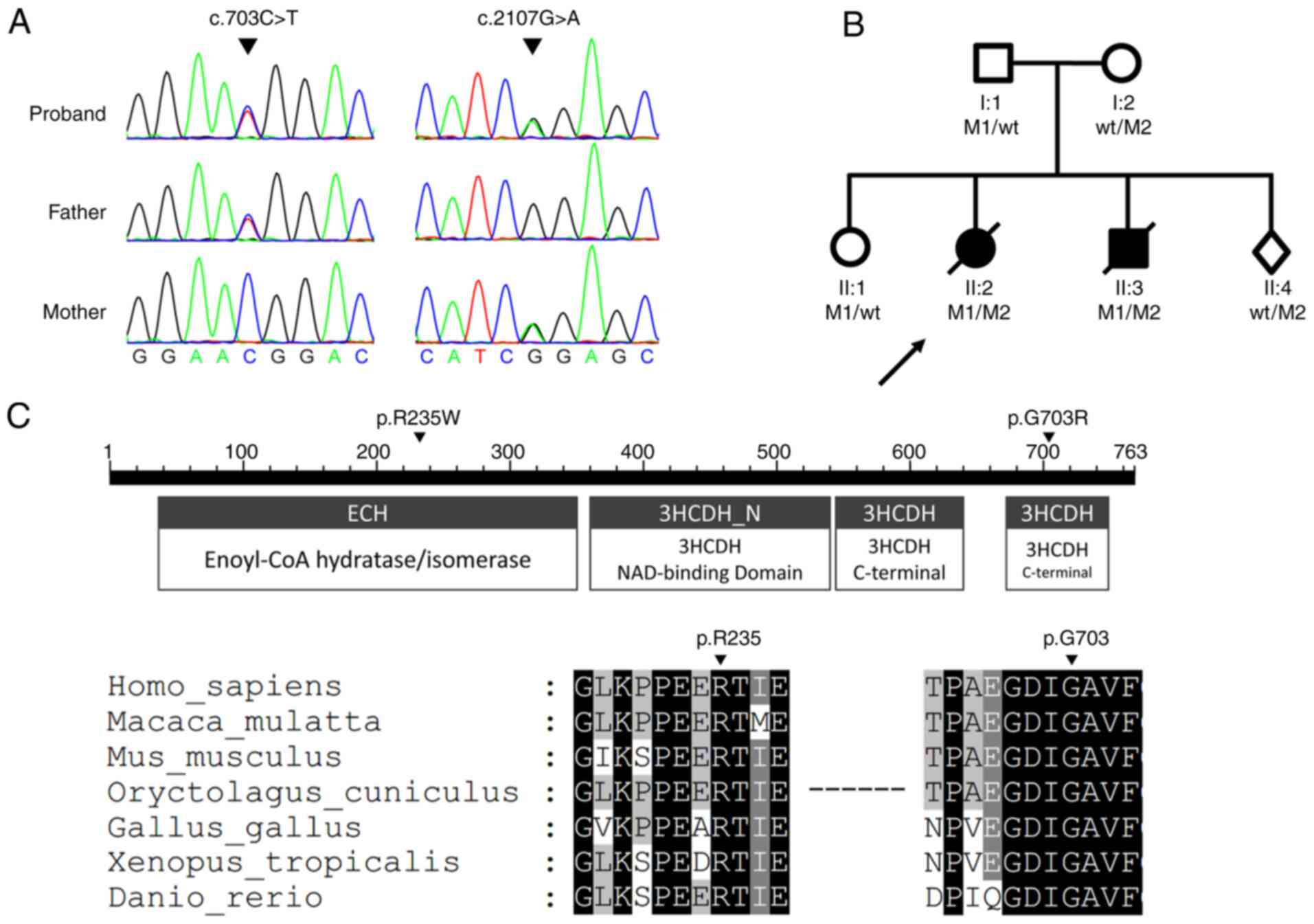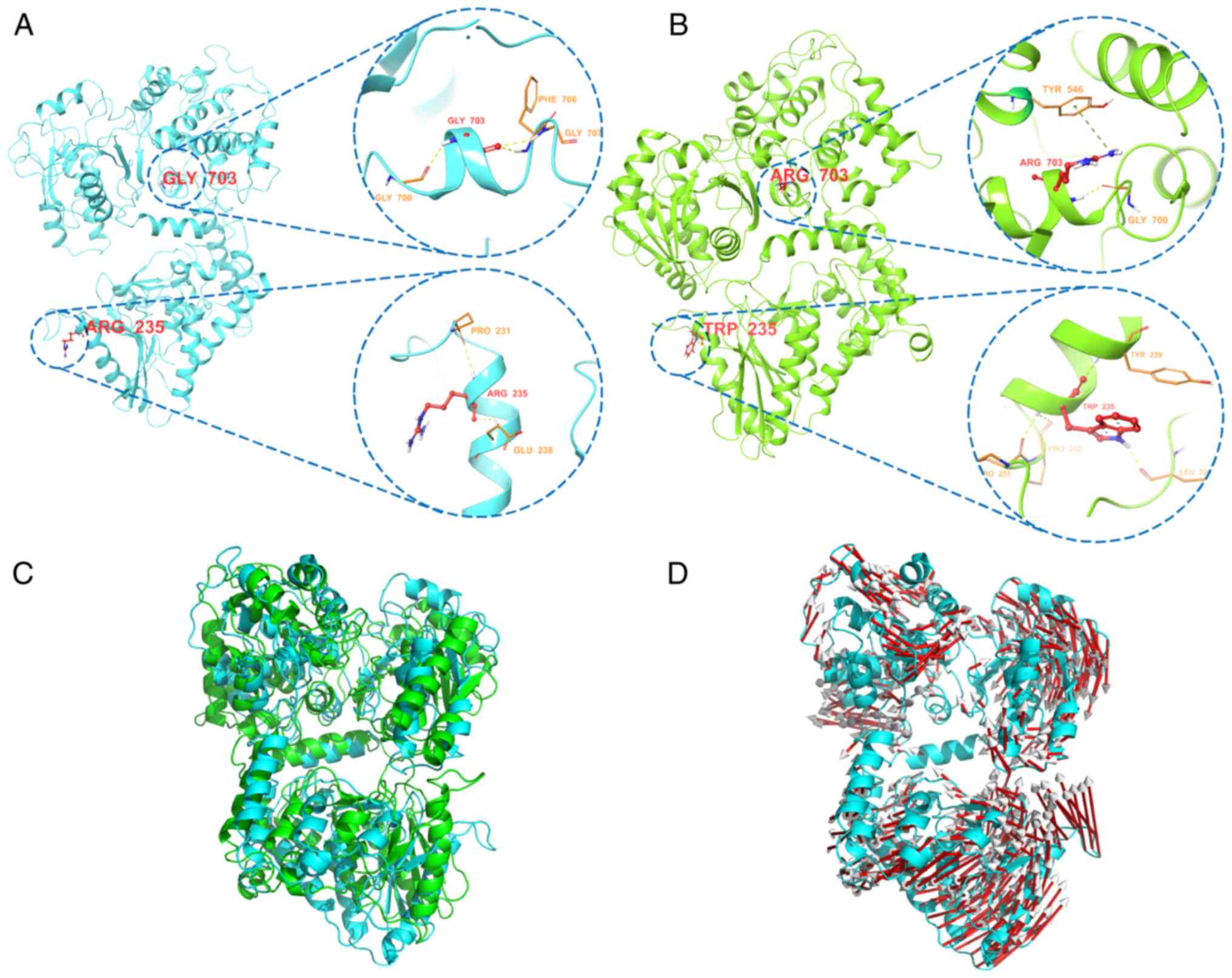|
1
|
Lotz-Havla AS, Röschinger W, Schiergens K,
Singer K, Karall D, Konstantopoulou V, Wortmann SB and Maier EM:
Fatal pitfalls in newborn screening for mitochondrial trifunctional
protein (MTP)/long-chain 3-Hydroxyacyl-CoA dehydrogenase (LCHAD)
deficiency. Orphanet J Rare Dis. 13:1222018. View Article : Google Scholar : PubMed/NCBI
|
|
2
|
Van Vliet P, Berden AE, van Schie MK,
Bakker JA, Heringhaus C, de Coo IF, Langeveld M, Schroijen MA and
Arbous MS: Peripheral neuropathy, episodic rhabdomyolysis, and
hypoparathyroidism in a patient with mitochondrial trifunctional
protein deficiency. JIMD Rep. 38:101–105. 2018. View Article : Google Scholar : PubMed/NCBI
|
|
3
|
Uchida Y, Izai K, Orii T and Hashimoto T:
Novel fatty acid beta-oxidation enzymes in rat liver mitochondria.
II. Purification and properties of enoyl-coenzyme A (CoA)
hydratase/3-hydroxyacyl-CoA dehydrogenase/3-ketoacyl-CoA thiolase
trifunctional protein. J Biol Chem. 267:1034–1041. 1992. View Article : Google Scholar : PubMed/NCBI
|
|
4
|
den Boer ME, Ijlst L, Wijburg FA, Oostheim
W, van Werkhoven MA, van Pampus MG, Heymans HS and Wanders RJ:
Heterozygosity for the common LCHAD mutation (1528g>c) is not a
major cause of HELLP syndrome and the prevalence of the mutation in
the dutch population is low. Pediatr Res. 48:151–154. 2000.
View Article : Google Scholar : PubMed/NCBI
|
|
5
|
Karall D, Brunner-Krainz M, Kogelnig K,
Konstantopoulou V, Maier EM, Möslinger D, Plecko B, Sperl W,
Volkmar B and Scholl-Bürgi S: Clinical outcome, biochemical and
therapeutic follow-up in 14 Austrian patients with long-chain
3-Hydroxy Acyl CoA dehydrogenase deficiency (LCHADD). Orphanet J
Rare Dis. 10:212015. View Article : Google Scholar : PubMed/NCBI
|
|
6
|
Wanders RJ, IJlst L, van Gennip AH, Jakobs
C, de Jager JP, Dorland L, van Sprang FJ and Duran M: Long-chain
3-hydroxyacyl-CoA dehydrogenase deficiency: Identification of a new
inborn error of mitochondrial fatty acid beta-oxidation. J Inherit
Metab Dis. 13:311–314. 1990. View Article : Google Scholar : PubMed/NCBI
|
|
7
|
Sykut-Cegielska J, Gradowska W,
Piekutowska-Abramczuk D, Andresen BS, Olsen RK, Ołtarzewski M,
Pronicki M, Pajdowska M, Bogdańska A, Jabłońska E, et al: Urgent
metabolic service improves survival in long-chain 3-hydroxyacyl-CoA
dehydrogenase (LCHAD) deficiency detected by symptomatic
identification and pilot newborn screening. J Inherit Metab Dis.
34:185–195. 2011. View Article : Google Scholar : PubMed/NCBI
|
|
8
|
Boutron A, Acquaviva C, Vianey-Saban C, de
Lonlay P, de Baulny HO, Guffon N, Dobbelaere D, Feillet F, Labarthe
F, Lamireau D, et al: Comprehensive cDNA study and quantitative
analysis of mutant HADHA and HADHB transcripts in a French cohort
of 52 patients with mitochondrial trifunctional protein deficiency.
Mol Genet Metab. 103:341–348. 2011. View Article : Google Scholar : PubMed/NCBI
|
|
9
|
Hong YB, Lee JH, Park JM, Choi YR, Hyun
YS, Yoon BR, Yoo JH, Koo H, Jung SC, Chung KW and Choi BO: A
compound heterozygous mutation in HADHB gene causes an axonal
Charcot-Marie-tooth disease. BMC Med Genet. 14:1252013. View Article : Google Scholar : PubMed/NCBI
|
|
10
|
Fu X, Zheng F, Zhang Y, Bao X, Wang S,
Yang Y and Xiong H: Mitochondrial trifunctional protein deficiency
due to HADHB gene mutation in a Chinese family. Mol Genet Metab
Rep. 5:80–84. 2015. View Article : Google Scholar : PubMed/NCBI
|
|
11
|
Bo R, Yamada K, Kobayashi H, Jamiyan P,
Hasegawa Y, Taketani T, Fukuda S, Hata I, Niida Y, Shigematsu Y, et
al: Clinical and molecular investigation of 14 Japanese patients
with complete TFP deficiency: A comparison with caucasian cases. J
Hum Genet. 62:809–814. 2017. View Article : Google Scholar : PubMed/NCBI
|
|
12
|
Liu ZR, Dong HL, Ma Y and Wu ZY:
Identification and functional characterization of mutations within
HADHB associated with mitochondrial trifunctional protein
deficiency. Mitochondrion. 49:200–205. 2019. View Article : Google Scholar : PubMed/NCBI
|
|
13
|
Tyni T, Palotie A, Viinikka L, Valanne L,
Salo MK, von Döbeln U, Jackson S, Wanders R, Venizelos N and Pihko
H: Long-chain 3-hydroxyacyl-coenzyme A dehydrogenase deficiency
with the G1528C mutation: Clinical presentation of thirteen
patients. J Pediatr. 130:67–76. 1997. View Article : Google Scholar : PubMed/NCBI
|
|
14
|
Barvinska O, Olkhovych N and Gorovenko N:
High prevalence of c.1528G>C rearrangement in patients with long
chain 3-Hydroxyacyl-CoA dehydrogenase deficiency from Ukraine.
Cytol Genet. 52:198–203. 2018. View Article : Google Scholar
|
|
15
|
Glasgow JF and Middleton B: Reye
syndrome-insights on causation and prognosis. Arch Dis Child.
85:351–353. 2001. View Article : Google Scholar : PubMed/NCBI
|
|
16
|
Richards S, Aziz N, Bale S, Bick D, Das S,
Gastier-Foster J, Grody WW, Hegde M, Lyon E, Spector E, et al:
Standards and guidelines for the interpretation of sequence
variants: A joint consensus recommendation of the American college
of medical genetics and genomics and the association for molecular
pathology. Genet Med. 17:405–424. 2015. View Article : Google Scholar : PubMed/NCBI
|
|
17
|
Scheuerman O, Wanders RJ, Waterham HR,
Dubnov-Raz G and Garty BZ: Mitochondrial trifunctional protein
deficiency with recurrent rhabdomyolysis. Pediatr Neurol.
40:465–467. 2009. View Article : Google Scholar : PubMed/NCBI
|
|
18
|
Zheng Y, Chen Y, Qiu X, Chen W, Lin Q,
Zeng Y, Zhao H and Zhu W: A verification of the application of the
non-derivatized mass spectrometry method in newborns screening of
metabolic disorders. Medicine (Baltimore). 98:e155002019.
View Article : Google Scholar : PubMed/NCBI
|
|
19
|
Terrone G, Ruoppolo M, Brunetti-Pierri N,
Cozzolino C, Scolamiero E, Parenti G, Romano A, Andria G, Salvatore
F and Frisso G: Child Neurology: Recurrent rhabdomyolysis due to a
fatty acid oxidation disorder. Neurology. 82:e1–e4. 2014.
View Article : Google Scholar : PubMed/NCBI
|
|
20
|
Landau YE, Waisbren SE, Chan LM and Levy
HL: Long-term outcome of expanded newborn screening at Boston
children's hospital: Benefits and challenges in defining true
disease. J Inherit Metab Dis. 40:209–218. 2017. View Article : Google Scholar : PubMed/NCBI
|
|
21
|
Diebold I, Schön U, Horvath R, Schwartz O,
Holinski-Feder E, Kölbel H and Abicht A: HADHA and HADHB gene
associated phenotypes-identification of rare variants in a patient
cohort by next generation sequencing. Mol Cell Probes. 44:14–20.
2019. View Article : Google Scholar : PubMed/NCBI
|
|
22
|
Pena LD, van Calcar SC, Hansen J, Edick
MJ, Vockley CW, Leslie N, Cameron C, Mohsen AW, Berry SA, Arnold
GL, et al: Outcomes and genotype-phenotype correlations in 52
individuals with VLCAD deficiency diagnosed by NBS and enrolled in
the IBEM-IS database. Mol Genet Metab. 118:272–281. 2016.
View Article : Google Scholar : PubMed/NCBI
|
|
23
|
Kang E, Kim YM, Kang M, Heo SH, Kim GH,
Choi IH, Choi JH, Yoo HW and Lee BH: Clinical and genetic
characteristics of patients with fatty acid oxidation disorders
identified by newborn screening. BMC Pediatr. 18:1032018.
View Article : Google Scholar : PubMed/NCBI
|
|
24
|
Ibdah JA: Acute fatty liver of pregnancy:
An update on pathogenesis and clinical implications. World J
Gastroenterol. 12:7397–7404. 2006. View Article : Google Scholar : PubMed/NCBI
|
|
25
|
Ronen J, Shaheen S, Steinberg D and Justus
KR: Acute fatty liver of pregnancy:A thorough examination of a
harmful obstetrical syndrome and its counterparts. Cureus.
10:e21642018.PubMed/NCBI
|
|
26
|
Schoeman MN, Batey RG and Wilcken B:
Recurrent acute fatty liver of pregnancy associated with a
fatty-acid oxidation defect in the offspring. Gastroenterology.
100:544–548. 1991. View Article : Google Scholar : PubMed/NCBI
|
|
27
|
Kobayashi T, Minami S, Mitani A, Tanizaki
Y, Booka M, Okutani T, Yamaguchi S and Ino K: Acute fatty liver of
pregnancy associated with fetal mitochondrial trifunctional protein
deficiency. J Obstet Gynaecol Res. 41:799–802. 2015. View Article : Google Scholar : PubMed/NCBI
|
















